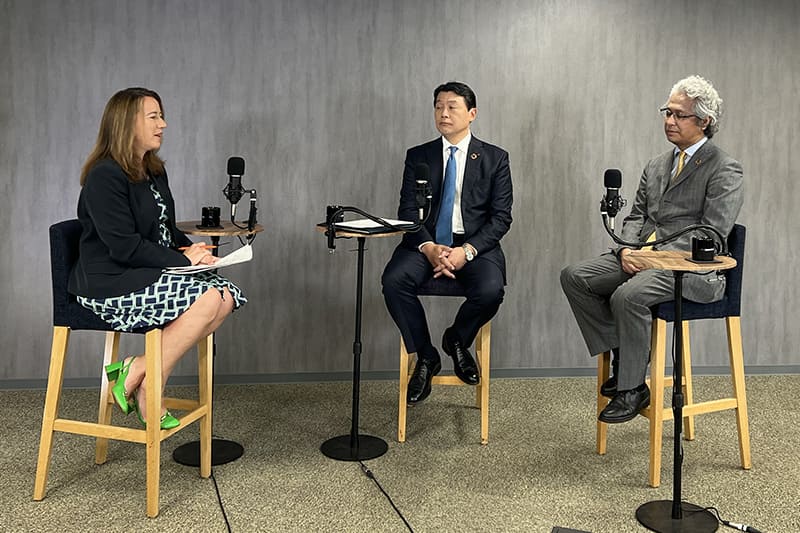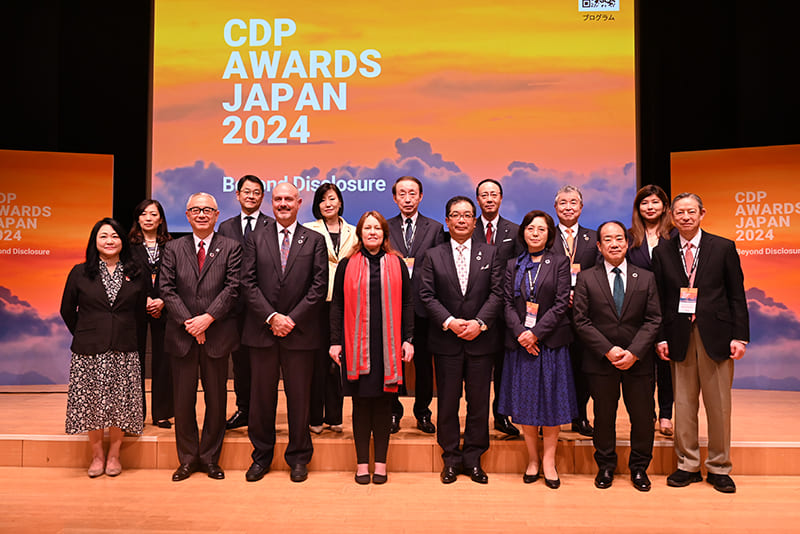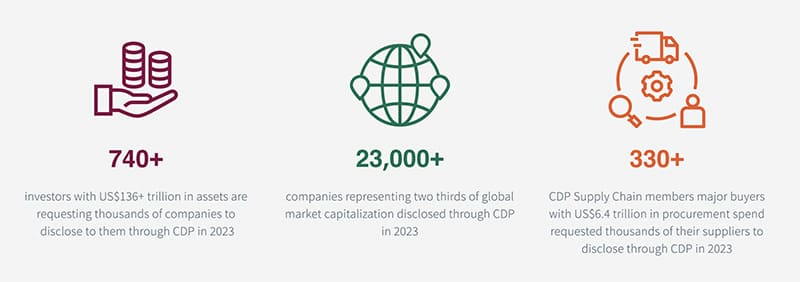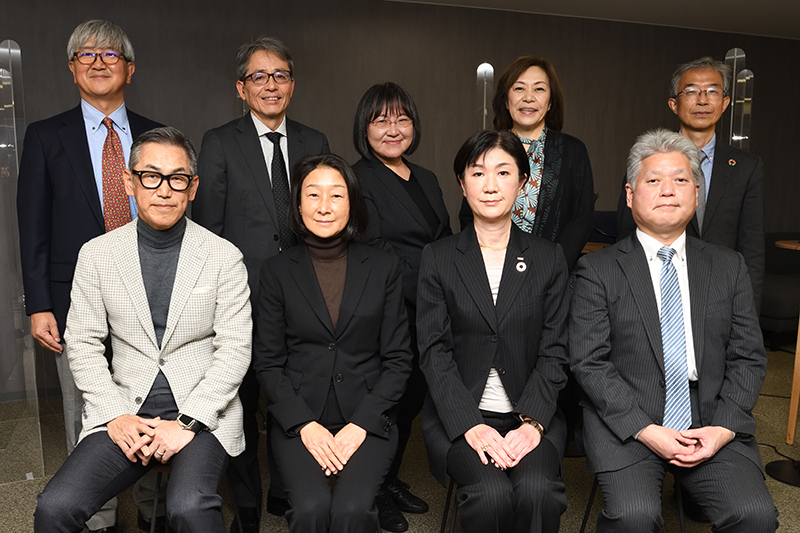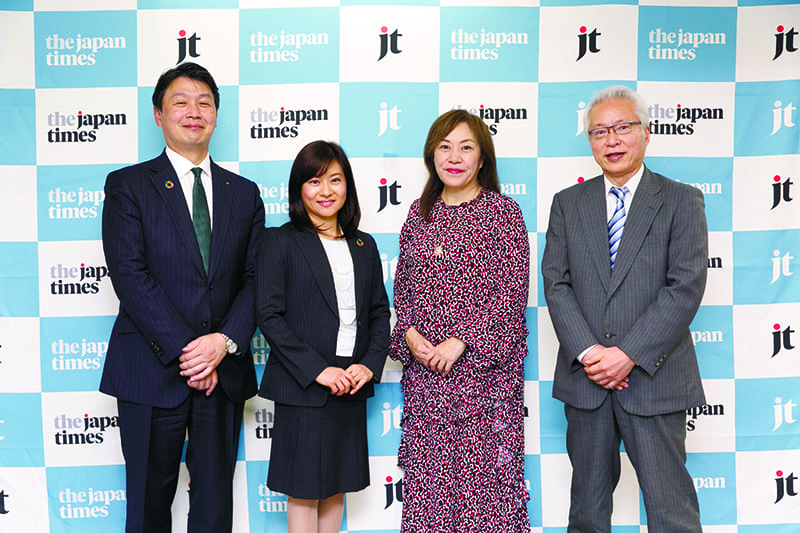March 26, 2024
Nissay Asset Management stays at forefront

The disclosure of nonfinancial information related to companies’ environmental efforts through CDP is increasingly appreciated in the investment market. In a recent interview with The Japan Times, Hiroshi Ozeki, the president and CEO of Nissay Asset Management Corp., celebrated the companies that made it onto CDP’s A List for one or more of the three categories of climate change, forests and water security, and encouraged those that have not yet carried out such disclosures to take a step forward.
“It has already been quite some time since it became a de facto standard to evaluate factors of the environment, society and governance (ESG) comprehensively in making investment decisions in the asset management industry, to whatever extent each investor decides,” Ozeki said of the list. Since 2008, Nissay Asset Management has been incorporating ESG factors in evaluating domestic stocks based not only on how well a company is doing on those factors but also how such efforts are linked with greater profitability and better cash flow.
The company joined the Net Zero Asset Managers Initiative in 2021. In line with the commitment made by this international initiative, a formal partner of the Race to Zero campaign by the United Nations Framework Convention on Climate Change, Nissay Asset Management has announced a target of halving its carbon footprint from the 2019 level by 2030 and achieving net-zero by 2050. “So far, we are on track,” Ozeki said. “We also got registered as a TNFD (Taskforce on Nature-related Financial Disclosures) Adopter in January this year to broaden our effort to contribute to the conservation of natural capital, including biodiversity.”
At the same time, the government has been updating various requirements and policies related to the investment sector. “The Financial Services Agency has introduced a guideline for ESG investment and promoted measures against greenwashing. To keep pace, asset management companies need to continue upgrading their efforts,” Ozeki said.
For investors to delve deeper into ESG factors in their portfolios and potential investee companies, data disclosed by companies through CDP is useful. “CDP deals with a wealth of data related to not only carbon emissions but also the environment in a larger context under its three categories of climate change, forest and water security. The CDP scoring has been widely recognized in the global market. In addition to gathering data about specific companies in consistent formats, we can keep ourselves updated on global trends,” Ozeki said.
For the company’s equity and bond funds with ESG elements, data provided by CDP is used both when in-house analysts give ESG ratings based on their own standards and while they are managing funds, to ensure their ratings are not too far off the CDP’s evaluations. “Company officials we speak to are aware of what their company is disclosing via CDP. To have a constructive conversation, it is a must that we, the investor side, have referred to not only the most recent data but also the accumulated history of the company’s efforts in the CDP database,” Ozeki said.
Discussing the 24% increase in companies that disclosed through CDP globally in 2023 compared to the previous year, Ozeki said it is a matter of course to see more companies participate as climate-related disclosures shift from being voluntary to mandatory.
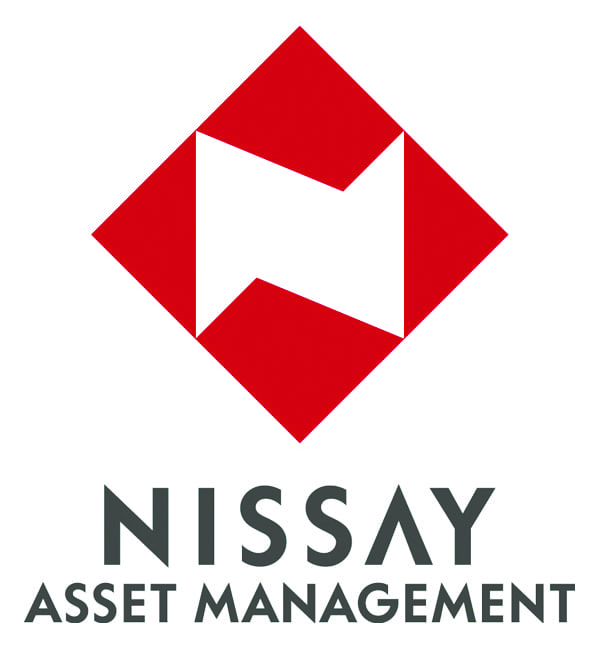
“I think that there are many companies that are trying to meet the disclosure requirements of CDP, hoping that it helps them prepare for disclosure through other platforms as well, such as the Task Force on Climate-Related Financial Disclosures (TCFD) and the International Sustainability Standards Board,” Ozeki said. He pointed out that creating laws and accounting standards is time-consuming because various adjustments need to be made to consider different interests. “But you cannot become compliant overnight without any preparation. CDP serves as a global standard that companies can use to be ready for anything that may come up next.”
About 120 companies out of the nearly 400 that scored an A in at least one of the three categories were Japanese. Two of the 10 that achieved triple A’s were Japanese. Ozeki sees this as proof that more and more Japanese companies are ready to be invested in globally. “Japanese companies tend to follow rules and instructions strictly in the disclosure process. Stability and improvement in the evaluation will be a powerful message to investors,” he said.
He further encouraged all publicly listed companied to participate in disclosure through CDP. “Investors need to deeply study the data that companies spent time and resources to create, and use it for effective engagement with the investee companies,” he said.
What asset management companies look at and how they invest is changing. “Investors, including ourselves, used to invest into companies with low carbon emissions, but that is not enough to achieve net-zero,” Ozeki said. That is why in the past several years, Nissay Asset Management has started to support the transition of high-emission companies in industries such as energy, iron and steel, chemicals and cement by deeply engaging with them, and to invest more into the companies that are contributing to the development of basic technologies or making innovations necessary to achieve net-zero.
“What we look at is whether the company commits to net-zero and has an important set of items to achieve net-zero, including a target, action plan, strategy and transition process,” Ozeki said. He also pointed out a critical cultural characteristic of Japanese companies: “They are reluctant to speak up about things that they are not 100% sure they can achieve. Even though they have a plan and are making efforts behind the scenes, which I think is a loss,” he said.
International companies, on the other hand, tend to set and announce ambitious targets. “They have the attitude of thinking and acting together. By announcing the goal, communication starts and necessary wisdom, power, information and ideas gather. Japanese companies need to shift to the global way if they are looking to be invested in by international investors,” Ozeki said.
He added that the same can be said about the country itself in the context of international collaborations in the fight against climate change. Even though both the public and private sectors are making extensive efforts, Japan tends to be accused of avoiding making clear commitments because it is overly concerned about the feasibility of achieving them. “We need to show the international community that we are heading the same direction, and share the advanced technologies and practices we have. That is the only way to make ourselves heard and respected, which will lead to the effective use of Japan’s technologies and experiences on a global scale,” Ozeki said.


